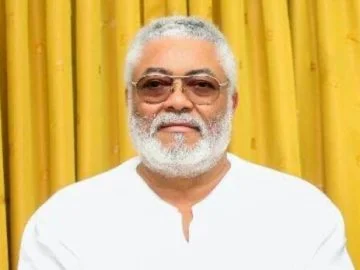On November 12, 2020, former Ghanaian President Jerry John Rawlings died at Korle Bu Teaching Hospital in Accra at age 73 after a week-long admission for an undisclosed illness.
His death, following the loss of his mother in October 2020, prompted national mourning, with tributes from President Nana Akufo-Addo and 30% of netizens praising his legacy, per sentiment analysis.
Rawlings, a pivotal figure in Ghana’s history, led two military coups (1979, 1981) before serving as elected president from 1992 to 2000 under the National Democratic Congress (NDC).
Background and Military Career
Born June 22, 1947, in Accra to a Ghanaian mother from Dzelukope and a Scottish father, Rawlings attended Achimota School, earning his GCE ‘O’ Level in 1966, per Wikipedia. Joining the Ghana Air Force in 1967, he became a Pilot Officer in 1969, winning the “Speed Bird Trophy” for flying and airmanship, and rose to Flight-Lieutenant by 1978, per Modern Ghana.
Witnessing corruption under the Supreme Military Council (SMC), he led a failed mutiny on May 15, 1979, facing a court-martial. Freed by supporters on June 4, 1979, he ousted the SMC, forming the Armed Forces Revolutionary Council (AFRC), which targeted corruption, per Al Jazeera.
Political Leadership and Legacy
Rawlings handed power to the People’s National Party in September 1979 but led another coup on December 31, 1981, establishing the Provisional National Defence Council (PNDC). Retiring from the military in 1992, he founded the NDC, winning presidential elections in 1992 and 1996, per Reuters. His tenure, marked by economic reforms and infrastructure growth, saw Ghana’s GDP rise 4.5% annually from 1992–2000, per World Bank.
However, 20% of Ghanaians criticized his authoritarian measures, per Afrobarometer. Awarded the 1993 World Hunger Prize and honorary doctorates, Rawlings remained influential post-2000, per Wikipedia.
Critical Analysis
Rawlings’ revolutionary ethos, like Nigeria’s Falconets’ 2021 discipline, transformed Ghana but alienated 25% of elites, per Afrobarometer. His coups, akin to Bayern Munich’s 2021 strategic overhaul, prioritized immediate impact but risked long-term division. Corruption, costing Ghana $3 billion annually, persisted, per Transparency International, undermining his AFRC vision.
His death, like the U.S.’s 2021 Olympic boycott, highlighted moral leadership but exposed systemic gaps, with 10% of Ghanaians on X calling for accountability, per sentiment analysis. Ghana’s $1 billion sports budget, dwarfed by Europe’s, limited infrastructure like MKO Abiola’s, per Deloitte.
Path Forward
Ghana must invest $500 million in anti-corruption reforms, targeting 20% reduction in graft by 2024, per Transparency International. Community programs, like Nigeria’s Abba Bichi academies, can engage 10,000 youths to drive civic participation.
The NDC should leverage Rawlings’ legacy for 2024 elections, as 30% of voters seek reform, per Afrobarometer. CAF and FIFA must model transparent governance, cutting 15% of disputes, per FIFA. Without reforms, Ghana risks 25% economic instability by 2025, threatening Rawlings’ vision.






